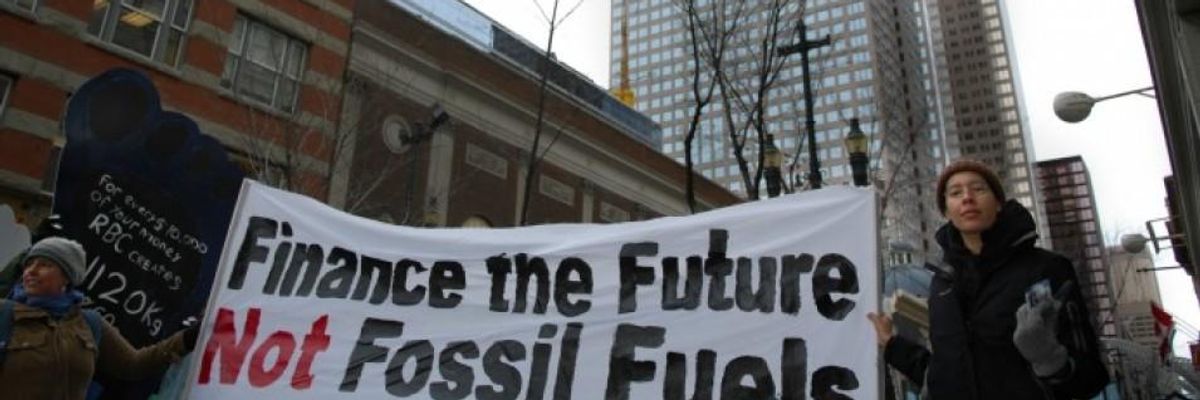Environmental advocates and indigenous groups on Monday welcomed the news that Wells Fargo would not finance oil and gas projects in the Arctic, including in the Arctic National Wildlife Refuge--an area the Trump administration is poised to open for fossil fuel exploration--the latest victory in a pressure campaign on banks over their role in abetting the climate crisis.
According to Sierra Club, the announcement came in an update to the banking giant's environmental policy. "Wells Fargo does not directly finance oil and gas projects in the Arctic region, including the Arctic National Wildlife Refuge (ANWR)--part of a larger 2018 risk-based decision to forego participation in any project-specific transaction in the region," the document (pdf) states.
"In just the last three months, half of the top six U.S. banks have rejected funding Arctic drilling."
--Ben Cushing, Sierra ClubThe update was not, however, met with full-throttled cheers from climate advocates. "The update does not make improvements to the bank's other oil and gas financing policies," Sierra Club noted.
Yet something remarkable appears to be shifting. Wells Fargo is not the only bank forgoing financing Arctic development. Just last week, JPMorgan Chase ruled out financing new oil and gas development in the Arctic. In December, Goldman Sachs announced it would not finance such projects either.
Putting the new development in context, Sierra Club campaign representative Ben Cushing said on Twitter, "In just the last three months, half of the top six U.S. banks have rejected funding Arctic drilling."
Cushing called out the other three major U.S. banks--Citigroup, Bank of America, and Morgan Stanley--and asked, "Which one of you wants to be last of the bunch to #ProtectTheArctic & #StandWithTheGwichin?"
The latter hashtag is in reference to the Gwich'in, the indigenous people who call the coastal plain of the refuge--the calving grounds of the Porcupine Caribou Herd--"the sacred place where life begins."
They've fought against development of ANWR, saying it threatened "cultural genocide."
"For years, we have been speaking out about the need to keep drill rigs out of our sacred lands in the Arctic Refuge, and it's amazing that a growing number of major banks are listening," said Gwich'in Steering Committee executive director Bernadette Demientieff. "The Arctic Refuge is critical to our people's food security and way of life. Our human rights will not be dismissed."
"The fight to protect this place is far from over," she continued, "and we will continue to hold accountable any bank, oil company, or politician that seeks to benefit from its destruction."
Author Bill McKibben, founder of the climate advocacy group 350.org, called the new development a "victory for the Gwich'in, the wildlife, and the planet."
There are signs that fight over fossil fuel extraction in the area could soon reach a critical moment. According to Bloomberg News, former fossil fuel lobbying Interior Secretary David Bernhardt said Saturday the Trump administration is "about to finalize a leasing plan" for ANRW--a prospect that's previously drawn ire over ecological and human rights impacts.
"The Trump administration still hasn't given up on trying to sell off the Arctic Refuge for drilling, but oil companies should pay close attention to the events of the past few months and think twice before bidding," said Sierra Club's Cushing.
Dozens of House Democrats recently issued a letter pushing bank CEOs to do their part to protect the refuge, calling on them to follow in the steps of Goldman with regards to Arctic project financing.
"Any development in the coastal plain would permanently destroy this critically important intact ecosystem. We urge you to take a leadership role in recognizing that investing in a project that would threaten human rights and worsen the climate crisis is an expensive risk that's not worth taking," said the letter.
"The House of Representatives understands the importance of protecting the Arctic Refuge, which is why we approved legislation last year to protect this important landscape from destructive oil and gas exploration. Now is the time for banks to do their part," the lawmakers wrote.
The Wells Fargo announcement also comes a day after Democratic presidential primary candidate Elizabeth Warren released a plan "to stop Wall Street from financing the climate crisis."
Warren pointed to actions including Goldman's recent Arctic announcement and called for using the power of the Securities and Exchange Commission (SEC) to make companies account for climate risks.
"While these actions are a small step in the right direction," wrote Warren, "they are long overdue given the relative impact the financial industry has had on the climate crisis--and they're not enough to protect us from a climate-fueled financial collapse, either."
"We will not defeat the climate crisis if we have to wait for the financial industry to self-regulate or come forward with piecemeal voluntary commitments," she wrote.




